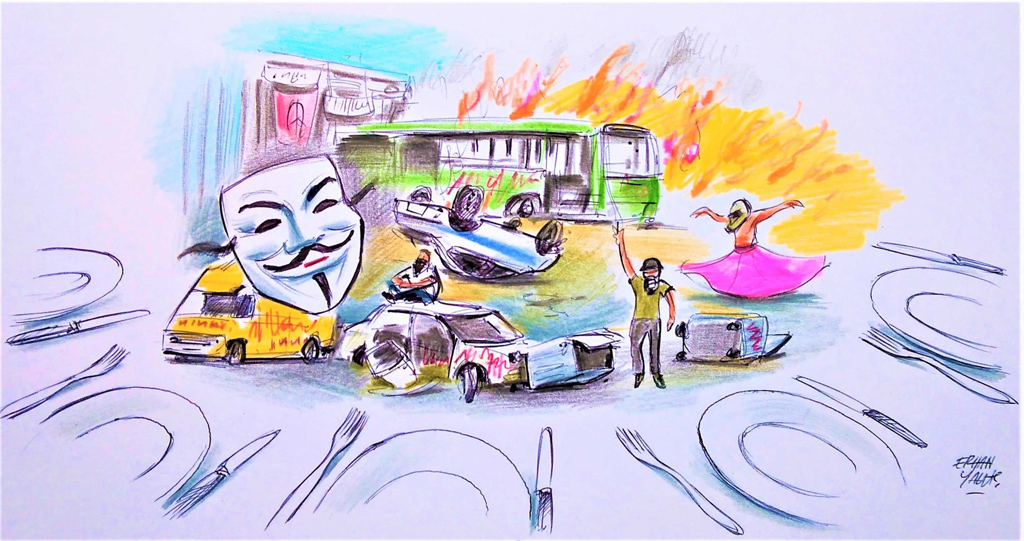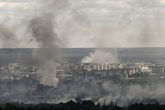President Recep Tayyip Erdoğan has harshly criticized the Gezi Park riots in his recent public speeches, as he asked Kemal Kılıçdaroğlu, the main opposition Republican People’s Party (CHP) chairperson, whether the main opposition leader would contest the presidential election.
Erdoğan also accused Kılıçdaroğlu of bearing political responsibility for what he called “an ambush of Turkish democracy in the guise of trees and the environment,” “an attempt to usurp the people’s will through street terror,” “an attempt by the bewildered minority to suppress the silent majority” and “a revolt that targeted the Republic of Turkey and its international interests.”
Let us recall that Kılıçdaroğlu, together with Good Party (IP) Chairperson Meral Akşener, had placed the Gezi riots at the heart of their opposition to Turkey’s current government against the backdrop of the Osman Kavala trial. Glorifying the protest by saying that “Gezi is the voice of freedom in this country,” the main opposition leader made a rather ambitious definition of “resistance” at the time: “The Gezi resistance is the voice of young people who speak for freedom in our democracy’s history. It is a national movement devoted to solidarity, peace, fraternity and democracy.”
Again, on April 27, Akşener described the Gezi riots as “the national consciousness getting back on its feet.” That praise was intended to manufacture broad legitimacy for those protests in the political center: “It represents an objection and a resistance by our youth – nationalists and leftists, conservatives and seculars, women and men – against the regime of that period.” Akşener’s excess praise for Gezi – “Gezi is the same as the spirit of 1908 that opposed the reign of oppression”– however, was viewed as a critique of Sultan Abdulhamid II and frowned upon by the right.
Ahmet Davutoğlu and Ali Babacan, the former Justice and Development Party (AK Party) politicians who are currently seated around the opposition’s “table for six,” announced that they “did not participate in the case nor filed any complaints against anyone.” Nonetheless, the former could not refrain from stating that he would “never forget” that night, when people called for the storming of his residence on social media, in an attempt to reflect on that period and the conservatives’ sentiment.
Erdoğan’s simultaneous critique of Kılıçdaroğlu, the CHP and the Gezi rioters, coupled with the opposition bloc’s endorsement of Gezi, highlights the following question: Could the war of words over the “Gezi resistance/riot” be the main ideological flashpoint on the campaign trail? Could the “table for six” and the Peoples’ Democratic Party (HDP) agree on Kılıçdaroğlu’s candidacy and unite around the “spirit” of Gezi? Could the opposition bloc’s conservative and nationalist components find common ground with the Gezi mindset – which corresponds to the “secularist anger” among the CHP circles?
After nine years, the debate over what the Gezi riots represented (or did not) seems to emerge as a core feature of Turkish politics. The possibility of Kılıçdaroğlu running for president, either as the opposition’s joint candidate or on behalf of the CHP, further fuels that discussion. From the perspective of the CHP, now emboldened, Gezi represents an inconclusive process and must be completed in the 2023 elections. For them, Gezi is the most striking symbol of the fact that the AK Party and its leader, Erdoğan, must be held accountable.
It is unlikely for any member of the opposition bloc, which Kılıçdaroğlu has come to dominate, to publicly disagree with that praise of Gezi. Whereas Akşener went further than Kılıçdaroğlu in praising the riots, the rest find themselves in an awkward position and merely offer apologies in the face of the Gezi rage.
From the perspective of the People’s Alliance, however, the Gezi riots represented another link in the chain of events that featured the National Intelligence Organization (MIT) crisis of February 2012, the judicial coup attempt of December 2013, the “trench” events of 2015 and the coup attempt of July 15, 2016 – an attack against Turkey. In other words, they view it as part of a broader assault as opposed to an independent act of uprising.
The clash between those two opposite views also represents a struggle over the interpretation of the AK Party’s last decade in power. In that context, the Felicity Party (SP), the Future Party (GP) and the Democracy and Progress Party (DEVA) are compelled to adopt a passive stance. After all, Davutoğlu and Babacan would move further away from conservative voters each time they apologize to the Gezi supporters. That is because the memory of the turbulence and power struggle of 2013-2016 remains quite fresh. Those movements have an extremely limited ability to communicate what happened in those years to their new friends and their respective base.
The most important takeaway from the Gezi controversy is that the deep-seated secularist anger among the CHP circles inflicts strong pressure on the party elite – even in the opposition. It is a source of concern that those folks, who strongly criticized Istanbul Mayor Ekrem Imamoğlu, whom many found promising, for inviting certain journalists on his tour of Black Sea, could go much further in case CHP ever comes to power.
In this article
- Opinion
- Daily Sabah
- Ekrem Imamoğlu
- Istanbul Metropolitan Municipality Mayor
- Kemal Kılıçdaroğlu
- May 28-August 20 2013 The Gezi Park Protests
- People's Alliance
- Recep Tayyip Erdoğan
- Table for Six | Turkish Opposition Alliance
- Türkiye
- Türkiye's Democracy and Progress Party (DEVA)
- Türkiye's Felicity Party (SP)
- Türkiye's Future Party (GP)
- Türkiye's Good Party (IP)
- Türkiye's National Intelligence Organization (MIT)
- Türkiye's Peoples' Democratic Party (HDP)
- Türkiye's Republican People's Party (CHP)



